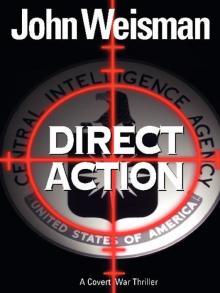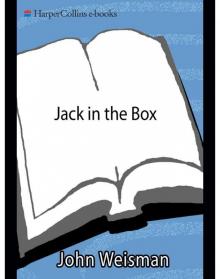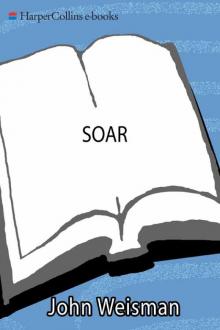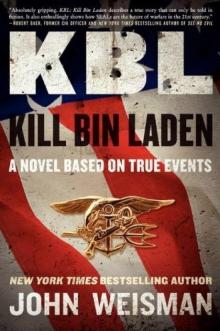- Home
- John Weisman
Jack in the Box Page 2
Jack in the Box Read online
Page 2
“I’ll look.” Sam withdrew a bunch of keys attached to a chain clipped to his belt. He squinted until he selected the right three, then unlocked a trio of padlocks the size of paperback books. The locks were carefully placed back on their hasps, then he scraped the battered door across the wet ground and disappeared inside.
There was silence for about forty seconds. What Yuri couldn’t see was Sam retrieve a small electronic device from his jacket and quickly check the car for listening devices or locator beacons. The Russian heard only the sounds of an ignition stammering, followed by the hiccuping ca-ca-ca-coughs of an engine starting up, followed by half a dozen puffs of gray-black smoke emanating from the shed. Finally, Yuri watched as a beat-up Zhiguli coupe with local plates backed out onto the uneven dirt, sputtering and backfiring as it jerked clear of the shed.
Sam opened the car door and eased his big frame out from behind the wheel, his hand still playing with the choke. “I’ll look for the socket for your Bentley while my Ferrari warms up.”
Thirty seconds later he was back. “Nothing,” Sam said. “I must have taken them home.” He wrestled with the shed door, slapped the hasps closed, and replaced the padlocks. “Sorry, Yuri Gregorovich.”
“No problem.” Yuri watched as Sam compressed himself into the car. Lucky bastard, he thought, to have a piece of ass on the side. Then Yuri G. Semerov rolled onto his back and pulled himself under the Latta, cursing the cheap Georgian wrench as he heard the Zhiguli’s engine grind off into the distance.
CHAPTER 2
1:04 P.M. Sam edged north on Prospekt Mira, caught the light, and turned left. Sixty feet past the metro, he pulled over just long enough to pick up a short, muscular man in a cheap fur hat, thick, patchwork leather hunting coat, and construction worker’s boots who’d emerged from under the metro canopy, a rolled newspaper tucked under his left arm—that was the good-to-go VRS6—as Sam had turned the corner.
Sam extended a gloved hand to the Russian. “Pavel Dmitriyvich.”
The Russian dropped the newspaper into the well, then slammed the reluctant door. “Sergei Anatolyvich,” he responded, grasping the American’s big paw tightly.
Sam gunned the engine, spun the wheel, and the little car accelerated past the botanical garden. “Next meeting on schedule in eight days,” he said in English. “I’ll leave a call-out signal on the Pushkin Museum mailbox. Letter G. We meet at the onetime back-up site—the stalovaya off Bolshaya Nitikskaya Street.”
“Eight days. Pushkin mailbox. Letter G. Stalovaya off Bolshaya Nitikskaya. Got it.”
‘Today is only our second meeting,” Sam continued tersely.
“Second meeting. Got it.”
Sam turned left onto a small side street. “You have been trying to recruit me so you can pass me along to military intelligence. I have been open to the idea, but you’re dubious because you believe me to be a provocateur. Nevertheless you suggested we get out of Moscow to escape CIA countersurveillance and talk things over some more.”
“Dubious. Countersurveillance. Got it.”
Now Sam made a series of turns, going left, then right, then left along the one-way streets, talking as he drove. “The Arbatskaya lamppost is dead. If you need an emergency meeting from here on, it’s an F on the first lamppost to the left of the Lenin Library metro stop as you’re facing north.”
“Lenin Library lamppost, first left as I face north. Letter F. Got it.”
“You remember what F is?”
“F?” The Russian harrumphed. “Short-short-long-short, Sam. My Morse is probably better than yours. In fact—”
“I’m changing the backup letterbox,” Sam cut him off. This hurried tradecraft was known to case officers as the Mad Minute because it had to be completed within the first sixty seconds of an agent meeting. “Church of the Trinity in Serebryaniki. Third icon on the left. Upper right-hand corner of the frame.”
“Serebryaniki. Third icon left side. Upper right-hand corner. Got it.”
“Emergency rendezvous changed to fourteen hundred twenty hours. Location remains the same.”
“Fourteen twenty. Got it.” Baranov paused, waiting. “Is that it?”
“Yes.” Sam turned the car north, toward Kaliningrad.
“Got it all. By the way, where are we going today?”
“Zagorsk. I thought we’d take the scenic route.”
“ ‘The scenic route?’ Good—no vizirs, no static surveillance teams.” Pavel Baranov removed the rabbit fur hat, revealing short-cropped blond hair, through which he ran stubby fingers. The scenic route was a series of narrow, largely unused back roads that wound through thick pine forests past dachas and farms for roughly twenty-five kilometers to the fourteenth-century walled town.
Sam scanned the rearview and sideview mirrors and was happy with what he saw. “Okay,” he said, “What’s your crisis, Pavel?”
“It’s not my crisis, Sam,” the Russian answered gravely. “It’s yours.” He unfastened the buttons on his hunting coat, reached inside, and eased a heavy envelope from the game pocket.
Baranov opened the envelope and extracted a single page from between two pieces of cardboard. He looked at Sam. “Are your hands clean?”
Sam shed his thick leather gloves, revealing latex ones beneath. He reached out eagerly. Still, Baranov withheld the sheet. “Gently, Sam.”
Gingerly, Sam took the page, laid it atop the steering wheel, and anchored it gently with the edge of his left hand. He glanced down, his eyes skipping between the road ahead and the sheet just below his line of sight. The document bore a Russian Foreign Intelligence Service logo, a top-secret stamp, and the legend “Urgent: Eyes of the President.” A paper patch sat at the topmost right-hand corner of the sheet. He focused—
Pavel’s voice interrupted. “Sam, Sam, watch out!”
“Ebat’kopat! Holy shit!” Sam braked hard, still barely missing the bumper of a slow-moving truck. He lifted the paper off the wheel, used his right hand to steer around the lumbering vehicle, checked the distance between the Zhiguli and the car ahead, then dropped his eyes to devour every syllable.
Devour, because Sam Waterman understood that the neat lines of Cyrillic type signified the end of life as he knew it.
EXECUTIVE SUMMARY
12.10.1998
01 Source OSKAR reports President W. Clinton held a secret meeting on 09.10.1998 with CIA director N. Becker, Deputy Secretary of State S. Talbott, and National Security Council Chief S. Berger regarding terrorist threats to Americans in former Soviet Republics.
02 Clinton was advised by Becker that American business interests in the former republics of Azerbaijan and Kazakhstan have been targeted by al-Qa’ida.
03 Becker suggested that CIA identify, isolate, and neutralize the al-Qa’ida threat through a covert action programme. He was challenged by Talbott, who maintained covert action would violate Azeri and Kazak sovereignty and antagonize the Russian leadership if discovered. Berger argued that if CIA’s covert action programme backfired, consequences could include regional instability and jeopardizing lucrative American petroleum partnerships.
04 Clinton agreed with Talbott and Berger.
05 Analysis follows.
Sam felt as if he’d been gut-shot. If the document was razvedka—what the old KGB used to call the real thing—the implications were cosmic. There’s another traitor in Washington—a high-level one, too. This was a goddamn all-star session, not some low-level policy gang bang with thirty junior staffers drinking lattes.
And if the document was a fabrication, the implications were equally cosmic. Pavel Baranov was a double agent—probably a creation of Vlad Putin and Edward Lee Howard’s aggressive counterintelligence operation—and everything the general’d been feeding Sam for the past six months, every rumor, gossipy info-bit; memo, briefing paper, and report: all of it—every syllable—had to be reevaluated. And whether the document was real or a fabrication, Sam was going to develop carpal tunnel syndrome before he finished writing the metric
ton of reports this meeting was going to require.
Sam kept his surging emotions under check. “Pavel, where did you get this?”
“I managed to get it. That should be enough.”
It wasn’t. Not by a mile. “Pavel—”
The Russian retrieved the sheet from under Sam’s hand.
“Where’s the rest?”
The Russian placed the document atop its envelope. “At Lubyanka. In a safe.” He pointed at the sheet with a stubby forefinger. “Where this has to go by tonight if I want to stay alive.”
“I need it, Pavel.”
“No way.”
“Then we go back to Moscow so I can make a copy.”
“I can’t risk that.” Baranov pointed at the thick paper patch. “See that? They hand-numbered these. I don’t want you knowing whose copy I was able to get. And who knows what else they did.”
Sam understood only too well what Pavel was saying. Highly classified documents were often individually typed, with minor alterations in the punctuation or the writing. Then they were numbered. If the document was leaked, the very wording that appeared in the newspapers—or was intercepted on its way to a hostile intelligence service—could lead counterintelligence to the perpetrator. If this page was genuine, there’d be no way Pavel would allow him to make a copy.
That was on the one hand. On the other hand, if the page was a fabrication, there was equally no way Pavel would allow him to reproduce it. It would be like handing over a signed confession.
Sam took his eyes off the road long enough to give his passenger a piercing glance. “I’ll have to handwrite a copy, Pavel.”
The general’s jaw tightened. He rubbed his wispy mustache with his right forefinger. He bit his lip. He looked into Sam’s eyes, trying to read what was going on in the American’s brain.
Sam, opaque, gave nothing back. He kept the Zhiguli’s speed even; gauged the distance between his car and the truck he was about to overtake. He floored the accelerator and passed the lumbering vehicle, letting silence do his work for him. Silence was a great ally in intelligence. Young case officers often spoke too much—chattered like nervous birds. Better to give your target time to think, ponder, consider. And then, you’d close the deal with a few well-chosen words.
So, Sam waited the Russian out. There was, he thought as he drove, more than a little irony in the fact that it had been a battle royal to recruit Baranov in the first place. Opposition had come from an unlikely direction, too: Langley itself. The problem had begun when CIA sent a delegation headed by a senior case officer named Frank Dillard to Moscow. Dillard was not one of Lubyanka’s favorites. He’d been chief liaison to Pakistan’s Inter-Services Intelligence Directorate, the re-mote control organization by which CIA ran the mujahideen fighters who chased the Soviets out of Afghanistan.
Dillard returned in triumph to headquarters, where in 1991 he became chief of CIA’s Central Asia Task Force, the successor to the old Soviet/Eastern Europe Division known inside Langley as “The Russia House.” Then, early in 1992, he was sent to Moscow to meet with the KGB leadership and discuss common areas of interest. Incredibly, the weeklong sessions resulted in the formation of what Dillard described as “a symbiotic relationship with a fraternal intelligence service.”
How Dillard of all people could have called it fraternal was beyond Sam Waterman’s comprehension. Especially since it was vodka clear to Sam, who was deputy chief in Paris at the time, that the Russians would never ever stop targeting America. And yet, incredibly, three days after Dillard returned to Washington, he’d sent out a cable over the signature of the deputy director for operations, instructing CIA stations worldwide that every Russian agent was to be dropped, and that all operations against Russian targets were to be closed down. Immediately. Henceforth, potential Russian developmental would be dealt with by Langley on a case-by-case basis, on an ADDO—assistant deputy director of operations—or higher level. No exceptions.
For Sam, it meant that he could no longer liaise with the French against Russian targets. Worse, the French stopped passing Langley other intelligence they’d previously shared.
When Sam asked Jean-Paul Meric, his French counterpart, why Quai d’Orsay was holding back critical information, Meric shrugged and muttered some diplomatic mumbo jumbo about “entering a transitional period of shifting liaison equities between our services.” Meric’s subtext was unambiguous: Sam was being told Paris was concerned CIA would leak sensitive information about French sources and methods to its new pals in Moscow and so would henceforth be held at arm’s length. He immediately sent an URGENT message to Langley about the development but never received an answer.
Dillard’s cable was bad enough. What was worse was that even after the Aldrich Ames and Harold Nicholson debacles (which proved Sam’s premonitions correct), neither CIA’s leadership, nor the administration, nor the congressional intelligence oversight committees reversed the idiotic no-recruiting-Russians rules.
Which meant, even in post-Ames 1997, Sam had had to fight tooth and nail for Pavel Baranov. He’d done so because it hadn’t been EMSI—the tradecraft acronym for the vulnerabilities of ego, money, sex, and ideology—that had caused the general to become a traitor. Baranov was different. He saw himself as a soldier whose mission was to rebuild a nation enslaved for more than half a century. He wanted freedom and self-determination, and he was willing to spy for his former enemy to achieve his goals.
And having uncovered this idealistic chink in the Russian’s otherwise well-armored personality, Sam Waterman fought for the opportunity to exploit it in America’s interests. And he had prevailed over strong resistance from the seventh floor. It had been worth the risk to his career, too—at least until today.
Sam noted Baranov’s fretful expression. Their relationship was complex. There was no ethical ambiguity, for example, in the fact that Sam Waterman honestly liked Pavel Baranov, although he often coldly manipulated the Russian. Their association was even fraternal: both were military men. Sam, a Marine, had been awarded the Bronze Star in Vietnam; Baranov, a paratrooper, fought in Afghanistan. The shared experience of combat gave them common ground on which to build rapport.
But when it came to crunch time, Sam knew that despite male bonding and camaraderie, it was he, not Pavel Baranov, who had to exert control. Indeed, control was the key to all successful case officer-agent interaction. He had to run Pavel Baranov. It couldn’t be the other way around.
Still, pushing—leaning on an agent—was never pleasant. But Sam understood he didn’t always have to did—he simply had to get the job done.
And so, he pushed. “I have to make a copy, Pavel. I need a piece of paper in my hand. That’s how things work. You know it and I know it.”
Silence. He watched as the general blinked thrice, half-nodded, and then said in whispered Russian. “But not the exact language, Sam, please. You must paraphrase.”
“Agreed,” Sam replied, his heart pounding so loudly in his chest he felt Baranov must hear it.
Sam looked at the Russian’s worried face. Was it because he really was in danger, or had Pavel sensed Sam’s perception that he might be a double.
AS THE LITTLE CAR IDLED on a side street just south of Zagorsk’s Sovietskaya Square, the two men worked out the language like a pair of lawyers hammering out a plea bargain. Beyond the square they could see past tourist buses to the walls of the fourteenth-century fortress that held a farmers’ market, half a dozen churches, and a classic Russian citadel. When they’d finished, Sam locked the car and they strolled through the old kremlin gates. Pavel bought himself the sorts of fresh vegetables that even generals found hard to come by in Moscow’s sparsely stocked stores. Sam bought a decoratively painted balalaika as a thank-you gift for Tom Kennedy. Then he watched as Pavel bargained for a set of matryoshka dolls. Sam had never seen anything like them: five fierce-faced KGB goons in red-tabbed green uniforms and brown pistol belts.
Baranov examined the dolls. The largest carried a pistol
in one hand and a pack of cigarettes in the other. “He’s about to serve up a Lubyanka breakfast,” Baranov said. “You know what that is, Sergei Anatolyvich?”
“A cigarette and a bullet, Pavel Dmitriyvich.”
“Correct.” The general agreed on a price, handed rubles to the vendor, and stuffed the hollowed-out figures back inside one another. Juggling his groceries, he presented the matryoshkas to Sam. “Happy birthday, Sergei Anatolyvich.”
Sam was genuinely touched. “Thank you for remembering, Pavel Dmitriyvich.”
Baranov flushed, embarrassed. “It is nothing.”
He still has a boyish face, Sam thought, even after having been to war. He patted the figurines. “I will treasure them. And to celebrate, let me buy us a late lunch.”
The general checked the thick gold Rolex on his wrist. “I think we’d best get going,” he said. “I have things to do in town.”
“So do I, it would seem.”
THEY WERE about halfway to the M8, on a winding stretch of back road bordered on both sides by thick forest, when a Mercedes overtook them. It was a huge car, a 500 series with the opaque windows favored by Mafiyosi. The driving lights flashed three times in Sam’s rearview mirror, and he steered toward the shoulder to let the black behemoth pass, catching a quick glance of the driver and the front-seat passenger as they drew close, swerved around the Zhiguli, and disappeared around the next curve.
“Byki Baranov grumbled, using the idiom for Mafiyosi muscle.
“Da—from the look of the ugly torpedo riding shotgun.”
Baranov scowled. “Yeltsin surrounds himself with them, you know.”
“You’ve said as much before.”
“He encourages them. He even does business with them.”
“With who, Pavel?”
“Who?” Baranov flicked his hand dismissively. “It doesn’t matter who. They’re all scum.” The Russian sighed, then stared pensively through the windshield.

 Direct Action
Direct Action Jack in the Box
Jack in the Box Soar
Soar KBL
KBL